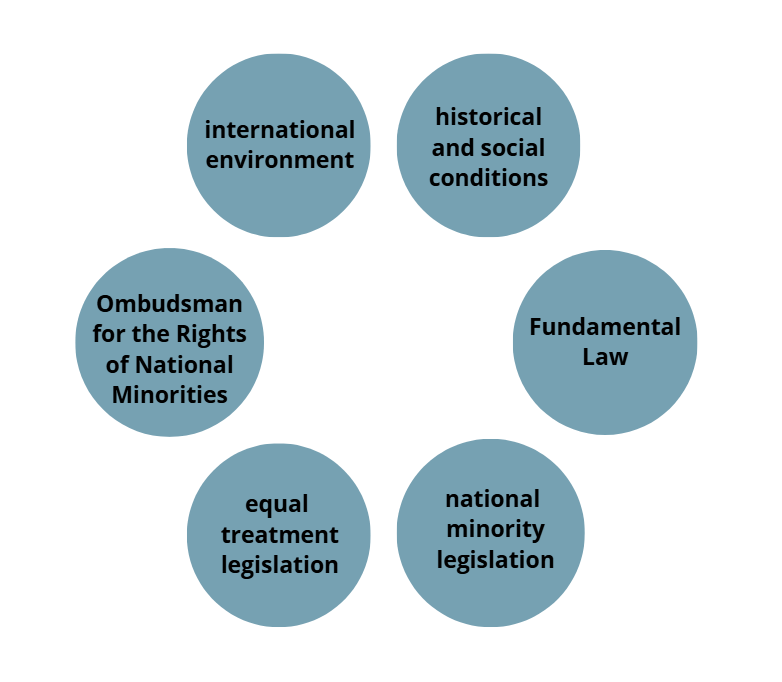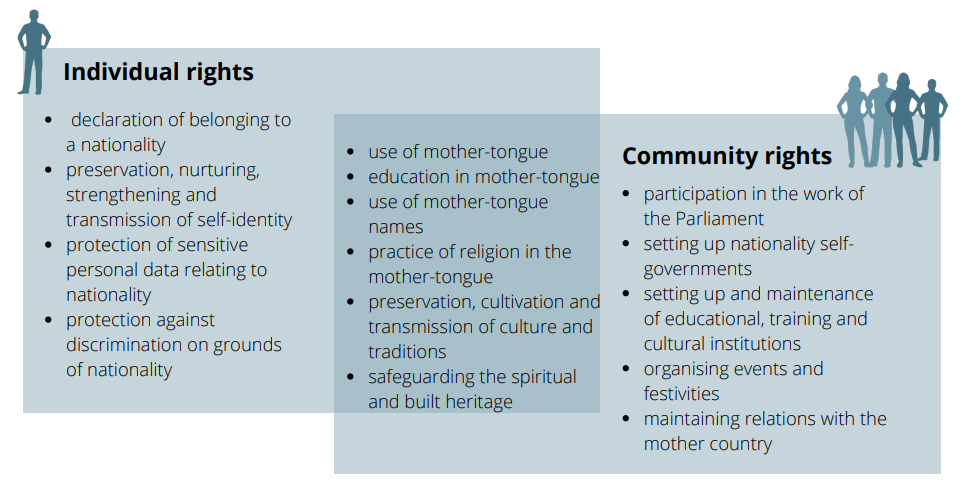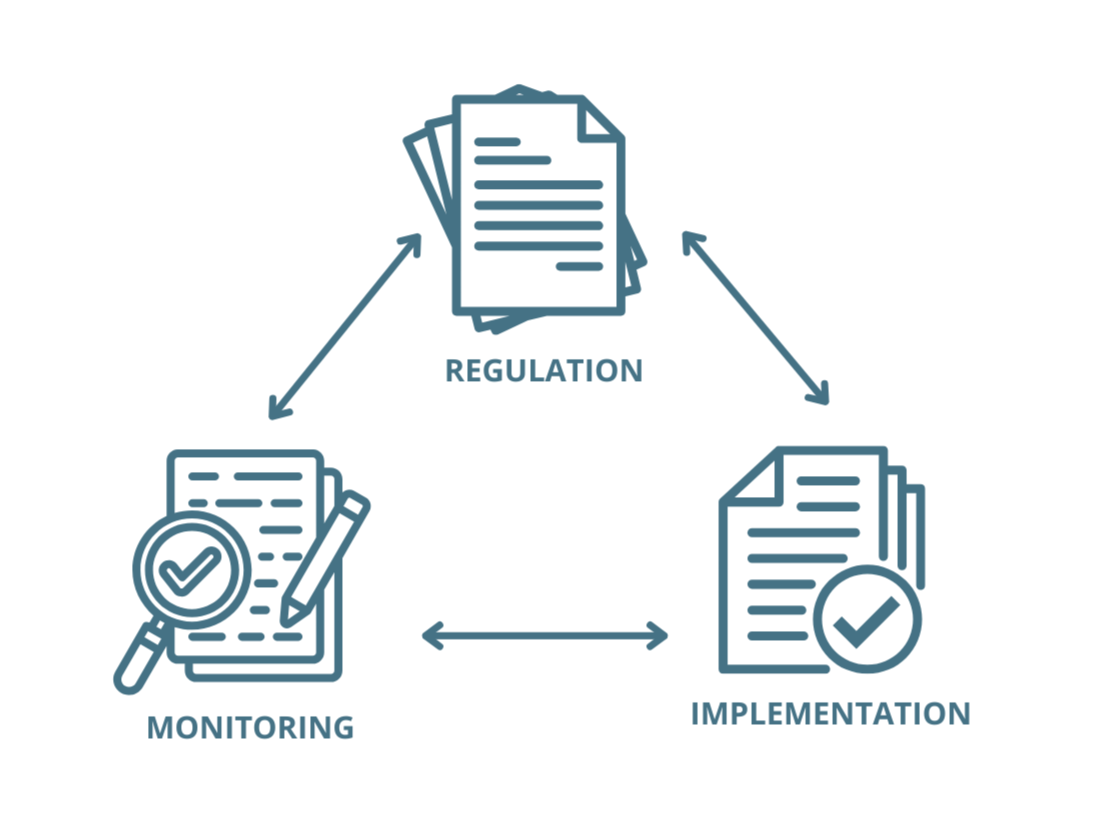Activities in Hungary - NJBH-EN
ACTIVITIES IN HUNGARY
1) INFO.sheets
INFO.sheets are short informative and professionally informative digital publications, which provide the reader with a comprehensive, yet comprehensible overview of the structure, permanent regulatory elements and guarantee institutions of the system for the protection of the nationalities. These publications are intended both for general knowledge and information purposes, but also serve as a gateway to a more in-depth understanding of the field for those with a more serious interest in nationality rights. The issues published are:

3) The situation of nationality rights in Hungary and the framework of the Minority Ombudsman's activities
The field of nationality law is one of the most complex segments of the Hungarian legal system: the body of law, which is based on international foundations and is extremely thoroughly elaborated in terms of text and dogma, has advanced support and control mechanisms. It has a solid historical and broad social foundation and is constantly and dynamically evolving. It is both a sensitive and strong regulatory environment, providing the basis for the unhindered assertion of rights and interests of nearly one million stakeholders.

This complex organic system has stood the test of time and practice: in 2018, we celebrated the 25th anniversary of the creation of the Act LXXVII of 1993 on the Rights of National and Ethnic Minorities, and in 2019 we remembered that it was also a quarter of a century ago, during the local elections of 11 December 1994, that nationalties living in our country were given the opportunity to form local nationality self-governments for the first time.
In Hungary, nationality communities are state-constituent factors – and although this idea was first explicitly declared in this form only in the Constitution, which was drafted at the time of the regime change, our history is a chronicle of a thousand years of coexistence. Since the exhortations of King Stephen, the belief that a monolingual and single-custom country is weak and fallible has been handed down from generation to generation. And geopolitical conditions and historical developments have helped our society to become a culturally and ethnically diverse community over the centuries. Although the entry of the nationality issue into the political arena, i.e. the turbulent century and a half since the mid-19th century, has been marked by countless disputes and often undignified or even inhumane legislative decisions that have made peaceful coexistence difficult, nationality communities have always been a valued part of our country at the social level.
At the time of the 1910 census, more than 45% of the population of 18 million (8 million citizens) declared themselves as belonging to a nationality, but the radical geopolitical changes of the 20th century, the following decades and the sad and dramatic historical events for the communities, such as the war victims, the Porajmos, the deportation and expulsion of Germans, the Slovak-Hungarian population exchanges and the assimilation policy of the communist regime, changed the situation fundamentally. Forced separation from the motherland and social processes further intensified assimilation, and communities developed a lasting distrust of the state and its institutions. As a result, in the 1990 census, only 2% of the population of 10.3 million, (213 111 citizens) identified themselves as being of nationality origin.
After the fall of communism, the issue soon gained its rightful place among political priorities – although one of the main reasons for this was the coordination and even interdependence of nationality policy and national policy objectives, not least because of the perceived and hoped-for impact on the protection of the rights of Hungarian communities living abroad. The governments of the time also recognised that nationality communities in Hungary are important links to their home countries, so good nationality policy can be one of the foundations of foreign policy. Realistic political objectives were only reinforced by the fact that the natural presence of nationalities became more and more known and understood at the level of decision-makers and society, and thus the status of 'state-constituent factor', which had already been declared at the time of the regime change, gained social meaning.
The protection of the rights of nationality communities is an integral part of the international protection of human rights, but it should be noted that the international documents adopted are based on the initiative of sovereign states and reflect the interests, will and cautious willingness of states to compromise. A further element of the effectiveness of international protection is that the protection of nationality communities is not based on reciprocity: States are not bound by the minority or nationality policies of other States. Their own legal systems and the specific characteristics of the nationality communities living on their territory give them a great deal of discretion in designing their legal protection systems: they are free to act in accordance with the specific characteristics of the state concerned, or even to refuse or ignore them, or even to act in express bad faith. It is no longer a matter for serious professional debate that the general rules and established practice prohibit violations of the requirement of equal treatment on grounds of nationality, and that States may even use the instrument of granting preference to ensure equal political and cultural opportunities for nationalities.
The Constitution of the Republic of Hungary, amended in 1989 within a democratic framework and in force until the last day of 2011, declared for the first time in Hungarian history that national and ethnic minorities living in the territory of our country are part of the power of the people: state-constituent factors. In addition to recognition, this basic document opened the way to ensuring de facto equality of rights for nationality and ethnic minorities living in the country, and guaranteed additional nationality rights to compensate for disadvantages.
In this context, the Constitution enshrined the right to collective participation in public life, the cultivation of nationality culture, the use of the mother tongue, education in the mother tongue, the right to use one's own language as a name, and the right to establish local and national-level nationality self-governments for the thirteen communities recognised as resident nationalities. It also raised the level of protection for the Bulgarian, Greek, Croatian, Polish, German, Armenian, Roma, Romanian, Ruthenian, Serbian, Slovakian, Slovenian and Ukrainian communities, requiring a two-thirds majority of the votes of the MPs present to pass the Act on the rights of national and ethnic minorities. On the basis of this mandate, and in order to implement its provisions, the Act LXXVII of 1993 on the Rights of National and Ethnic Minorities was adopted on 7 July 1993 with 96% of the votes of the Members of Parliament. The legislation was outstanding at European level, in its form it became the foundation of the nationality protection system in an unprecedented way, and its basic principles still determine the everyday life of the thirteen nationality communities recognised as resident in Hungary.
The entry into force of the Fundamental Law on 1 January 2012 has taken over most of the above provisions. The theoretical-essential basis of the regulation is the so-called National Avowal, which, among other things, instead of using the term national and ethnic minorities, in the new terminology, speaks about the protection and special role of nationalities.
The Fundamental Law, like the Constitution, recognises the nationalities living in Hungary as a state-constituent factor, as part of the political community, and Article XXIX of the Fundamental Law defines the highest level of their legal protection:
Paragraph (1) states that national minorities living in Hungary shall be constituent parts of the State. Every Hungarian citizen belonging to a national minority shall have the right to freely express and preserve his or her identity. National minorities living in Hungary shall have the right to use their mother tongue, to use names in their own languages individually and collectively, to nurture their own cultures, and to receive education in their mother tongues. According to paragraph (2), national minorities living in Hungary shall have the right to establish their self-government at both local and national level. Paragraph (3) provides that the detailed rules relating to the rights of national minorities living in Hungary, the national minorities, the requirements for recognition as a national minority, and the rules for the election of the self-governments of national minorities at local and national level shall be laid down in a cardinal Act. A cardinal Act may make recognition as a national minority conditional upon a certain length of time of presence and an initiative by a certain number of people claiming to be members of the national minority concerned.
The rules of the Fundamental Law are expanded by the Act on the Rights of Nationalities, replacing and partially transposing and supplementing the provisions of the previous Act on National and Ethnic Minorities. The Act also provides in detail for the basic individual rights of all thirteen nationalities living in Hungary, and, in contrast to international standards, their collective rights as well.

In order to provide an infrastructural basis for the above, the Act on the Rights of Nationalities also contains provisions on nationality educational and cultural self-government, the rights of nationalities in connection with the provision of media content, the establishment and functioning of nationality self-governments, and the economic basis for the provision of nationality public affairs.
Equal treatment and non-discrimination are also essential requirements and state obligations for effective and lawful operation, as enshrined in Article XV of the Fundamental Law. According to this provision, everyone is equal before the law. Hungary shall guarantee fundamental rights to all without discrimination of any kind, such as race, colour, sex, disability, language, religion, political or other opinion, national or social origin, property, birth or other status. The detailed rules, guarantee system and control mechanism of the declaration are laid down in the Equal Treatment Act, while specific areas of law, including the nationality segment, have their own specific supplementary rules.
Accordingly, the Act on the Rights of Nationalities stipulates that any violation of the requirement of equal treatment on grounds of nationality is prohibited. In addition, Hungary prohibits any policy or conduct which aims at or results in the assimilation of a nationality into the majority nation, the exclusion or segregation of a nationality from the majority nation, which aims at changing the nationality or ethnic relations of the areas inhabited by nationalities, which persecutes or intimidates a nationality or a person belonging to a nationality on account of his or her nationality, which makes his or her living conditions more difficult, which hinders the exercise of his or her rights or which aims at the forcible expulsion or relocation of a nationality. Hungary also undertakes to oppose in its international relations any political endeavours which lead to the above consequences. Hungary will seek to provide protection against such policies through the instruments of international law and international treaties.
To sum up, the specific characteristics of the Hungarian communities, primarily the lack of territorial concentration, have led to the concept of personal autonomy, and the basis for this has been the system of nationality self-governments and the network of cultural and educational institutions partly maintained by these. This legal framework, which is unique in Europe, and the financing and institutional system based on it, have enabled communities to develop their potential and strengthen their identity. As a result, according to the 2011 Hungarian census, 644 524 people, or 6.5% of the population, declared themselves as belonging to an officially recognised nationality. However, it is estimated that the actual number of nationalities is much higher: approximately 8-10% of the country's population of 10 million.
The situation of Roma communities has been different from that of other nationalities, with a particular additional perspective. As a nationality, they have benefited from the specific rights granted by cultural autonomy, but have been less able to exercise these rights in practice because of the poverty, vulnerability and discrimination that affect them to a greater extent than other groups in society. Five areas that remain particularly challenging today are education, employment, housing, health care and the specific situation of Roma women, which results in multiple discrimination. In the case of the Roma, in addition to the enforcement of nationality rights, equal treatment and the implementation of special equal opportunities programmes are therefore still a priority, as a means of combating historical disadvantages and the institutional discrimination they often face.
Special monitoring mechanisms with the appropriate tools, expertise and intervention potential are essential for monitoring the effective functioning of the field of nationality law and remedying any regulatory or implementation anomalies. In addition to identifying specific or general problems, the mechanism set up for this purpose can provide feedback to the legislator and the law-applying institutions by aggregating and sharing experiences, thus having a significant impact on the national and local functioning of the entire system of nationality law.

Click here for more information on the protection of the rights of nationalities in Hungary